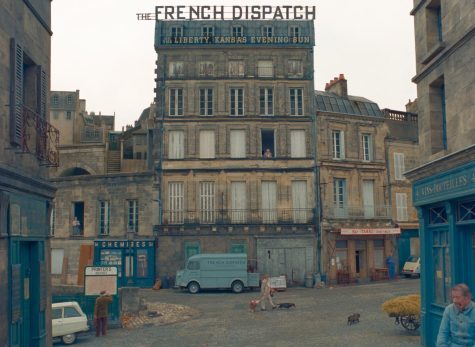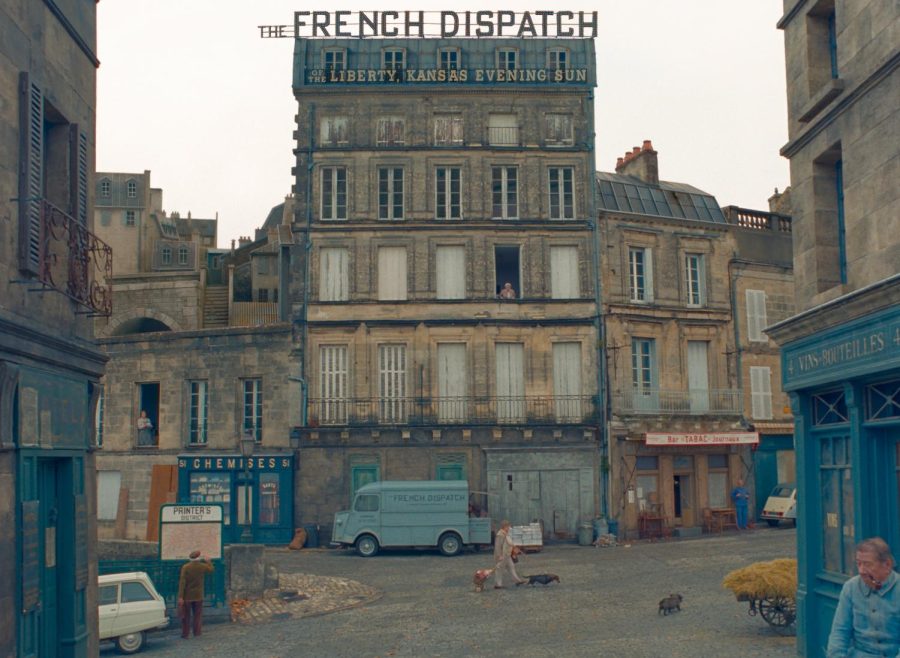‘The French Dispatch,’ ‘Halloween Kills’ open Chicago Film Festival
Photo Courtesy of The Chicago International Film Festival
The still from Wes Anderson’s “The French Dispatch” is shown above. The film, starring Bill Murray, Frances McDormand and Timothée Chalamet, was one of many shown at the Chicago Film Festival last week. The film premieres in the U.S. Friday.
The 57th Chicago International Film Festival kicked off last week with Wes Anderson’s “The French Dispatch” and David Gordon Green’s “Halloween Kills.” The films were among many shown at the festival, which is North America’s longest-running competitive film festival. Buzz had the chance to see some of the movies shown at the festival ahead of their releases. Here’s a recap of week one of the Chicago International Film Festival.
“Bergman Island”
Mia Hansen-Løve’s “Bergman Island” premiered at the Chicago International Film Festival on Thursday, Oct. 14, following its world premiere at the Cannes Film Festival on July 11. The story follows two filmmakers, Chris and Tony Sanders, who travel to Fårö, an island in the Baltic Sea, where famous Swedish filmmaker Ingmar Bergman lived, made his films and died. The two draw inspiration from the island for their own work as Bergman’s influence surrounds them at all points of their trip. As it progresses and the couple struggles to connect with one another, the film slowly unravels itself to reveal another film within it, creating a multidimensional story on screen.
While the film itself seems to have its own identity beyond being a direct parallel of Bergman’s work, elements of the film can be connected back to his unique style. Many locations in the film are recognizable to those familiar with Bergman’s work and act as Easter eggs to his fans watching the film. The first act feels like a lengthy exposition lacking build whereas the second act is where the film finds its core. The hidden film within “Bergman Island” is the heart of the story and makes it worth the wait to get past the first hour. The beautiful cinematography and striking performances illustrate the magic of filmmaking when art becomes reality.

“The Beta Test”
Get The Daily Illini in your inbox!
Set for wide release on Nov. 15, Jim Cummings’ “The Beta Test” is a dark comedy thriller about Hollywood culture and the influences of the internet. A talent agent receives a letter inviting him to participate in an anonymous sexual meeting. Afterward, he must begin a web of lies to protect himself from the dangers of others finding out about the affair. He becomes obsessive and filled with paranoia about how he was connected to the situation and uses his privilege to forcefully uncover secrets.
Though the film’s commentary on Hollywood and the film industry, as well as power and greed, is something that feels new and contemporary, the execution itself lacked the impact it seemed to intend. The concept is strong, but the foundation cracks when the storyline is actually drawn out as there are plot holes with seemingly no relevance. The comedy is refreshing and well-performed, which kept the film engaging throughout its runtime. “The Beta Test” makes for an interesting entrance into the satirical critiques of the issues in the film industry and the privilege that comes with being powerful.
“Drive My Car”
Ryusuke Hamaguchi’s “Drive My Car,” Japan’s entry for the 94th Academy Awards, was shown at the Chicago International Film Festival Saturday. Winner of Best Screenplay at the Cannes Film Festival, the film tells the story of Yūsuke Kafuku and his relationship with his chauffeur. Following the death of his wife, Yūsuke grows fond of Anton Chekhov’s “Uncle Vanya” and directs a production of the play as an outlet for his grief. Yūsuke must confront his suffering in order to unravel the mystery of the life his wife left behind.
The film ensures that the audience feels each and every second during the length of the showing; while the three hours do not pass quickly, the pacing is enough for the plot progression to feel natural. The connection between the film and the dialogue of “Uncle Vanya” is a beautiful tribute to the playwright and his writing style. Because the play is such a prevalent piece of the story, the film may lack a connection for those who are not familiar with Chekhov’s work; for those who are familiar, the film may feel much more intimate and complete. Complete with touching performances and an intricate, introspective screenplay, “Drive My Car” explores love, acceptance and peace in such a delicate manner on screen.

“The French Dispatch”
On Friday, Wes Anderson’s newest film, “The French Dispatch” will finally hit theaters. With an all-star cast, including several Oscar-nominees like Bill Murray, Frances McDormand, Saoirse Ronan and Timothée Chalamet, the film is witty and charming and proves that Anderson isn’t going anywhere.
The story takes place in a fictional French town, Ennui-sur-Blasé, and is Anderson’s ode to The New Yorker magazine. Based on real-life people, the editors of different sections of The French Dispatch put together a final edition of the magazine following the death of the editor, played by Bill Murray. The movie opens with Owen Wilson riding through France on a bike narrating his section, then moves on to Tilda Swinton narrating a story of an artist in prison falling in love with a guard. While the cast is stacked with Anderson veterans like Wilson, Murray and Adrien Brody, one of the most interesting characters is played by up-and-coming French actress Léa Seydoux, who is also in the latest Bond film.
While Anderson usually includes intersecting stories, this is his first time doing so in a segmented way. Each story ends before going onto the next, and some sections are better than others, with the earlier sections being the most interesting. The saturated cottage core colors and cinematography are classic Anderson with a twist. A lot of the film takes place in black and white, and at one point, turns into a comic strip.
After two years of anticipation, it’s safe to say that the film lives up to the hype. The script is funny, the characters are interesting and the backdrop is, of course, addicting to look at. Although, at some points, it feels like being a fan of Anderson and his style and knowing The New Yorker is a prerequisite to understanding some of the dialogue and nuances of the film.

“The Last Duel”
“The Last Duel,” which opened in theaters Friday, is Ridley Scott’s latest and arguably one of his most entertaining films in the last decade. The film, based on a true story, opens in a dreary 14th century France where women are the property of men and rape is punishable by death since it’s a crime against the woman’s male guardian. The epic drama explores what happens when the wife of a knight is raped and tries to speak up about it. Not only does no one believe her, but her husband and her perpetrator must fight to the death on horses to unveil the truth. If her husband dies, she gets burned alive for making false claims. If he wins, then she must be telling the truth.
The film stars Adam Driver, Jacques Le Gris, Matt Damon and Jodie Comer. With a lot of thrashing metal, erratic horses and bad haircuts, it moves — rather slowly in the beginning — through three different accounts of how the assault went down. The most interesting account by far is from the perspective of the woman, Marguerite, played by Comer. Unfortunately, you have to get through the two hours, which is essentially the two men embarking on a power trip, just to see it. Comer, though, gives one of her most impressive performances to date and is by far the most interesting character. Along with Comer, Ben Affleck is refreshingly funny in his role and steals the show in his limited scenes. This movie marks the first reunion of the writing duo, Affleck and Damon, since their box office smash, “Goodwill Hunting” in 1997. While the film drags on a bit and the script is confusing at times, it is still a thought-provoking story, best described as a medieval look at the #MeToo movement.
“Halloween Kills”
After a weekend of new movies, “Halloween Kills” has been hailed as the box office smash that no one saw coming. Even with the film hitting streaming platforms at the same time, it surpassed Ridley Scott’s “The Last Duel” and every other only-in-theater movie by millions. To most this may be a surprise, but after seeing both films, “Halloween Kills” is the superior one to see in theaters. The audience screamed together, laughed together and even teared up together. Horror film junkies will appreciate the fast pace narrative, abundance of jump scares and the return of Jamie Lee Curtis as Laurie Strode, and of course, James Jude Courtney as the infamous Michael Myers. It picks up right where the 2018 “Halloween” ended with Laurie on her deathbed being rushed to the hospital after the fire. After 11 movies, countless gun-shots and an entire house fire, Myers and his white mask have still managed to survive, which makes sense since this movie is not his last. “Halloween Ends,” the last movie in the installment, is set to come out in the next few years. That didn’t stop several characters from dying in this one though, which has definitely angered some fans of the Halloween saga.
It’s the kind of movie that pokes fun at itself. The police officers are dumbfounded and just as scared as any other person, characters get stoned and attempt to kill Myers with a small cheese knife, and even after living in the town for years, one unsuspecting couple thinks someone is just knocking on their door to be annoying. The dialogue is witty and offers moments of comedic relief in between the bloody murders. There’s never a dull moment, but the action does feel a bit excessive at times. There’s also a clear lack of suspense, moving on from one bit to the next, taking out characters. It’s not perfect, but it’s wildly entertaining and a great movie to see in theaters with other people.




